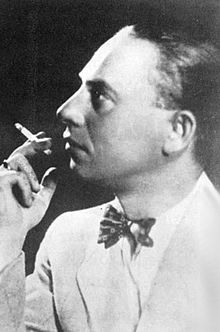Rezső Seress
Rezső Seress [ rɛʒøː ˈʃɛrɛʃː ] (born November 3, 1899 , † January 11, 1968 in Budapest ) was a Hungarian pianist and composer .
Life
Seress was of Jewish origin, his maiden name was Spitzer. His name was Magyarized in Hungary . As a Jew, he was sentenced by Hungarians to forced labor in occupied Ukraine during World War II .
Seress taught himself to play the piano and in 1933 composed the song Szomorú Vasárnap (English: Gloomy Sunday , German: Sad Sunday or Lonely Sunday ), which gained notoriety as a number of suicide cases were linked to him. Many American and European radio stations supposedly did not have the song on their list in this context. However, these are largely unconfirmed assumptions that are more likely to be classified as modern sagas .
The English translation of the song by Sam M. Lewis was later adapted frequently . The song also functioned as a red thread in the German-Hungarian feature film from 1999 A Song of Love and Death - Gloomy Sunday .
Seress attempted suicide in January 1968 by jumping out of the window of his Budapest apartment. He was admitted to the railway hospital (MÁV-kórház) and survived. Shortly afterwards he hanged himself on the wire ropes that held his plastered body.
Web links
- Rezső seress in the Internet Movie Database (English)
- Urban Legends Reference Pages (Gloomy Sunday)
- The 1936 English version was added to Archive.org
- Information on different versions of the song
- Diamant cover 2013 (Gloomy Sunday) on YouTube
| personal data | |
|---|---|
| SURNAME | Seress, Rezső |
| BRIEF DESCRIPTION | Hungarian composer |
| DATE OF BIRTH | November 3, 1899 |
| DATE OF DEATH | January 11, 1968 |
| Place of death | Budapest , Hungary |
